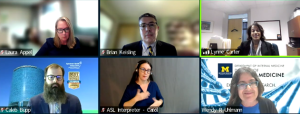

The MHA and fellow healthcare leaders joined a virtual panel discussion on clinical genomics Sept. 22 hosted by the White House Office of Science and Technology Policy and the Eunice Kennedy Shriver National Institute of Child Health and Human Development.
The purpose of the webinar was to raise awareness about the clinical utility and lifesaving potential of clinical genome sequencing, as well as highlight coverage models for state Medicaid programs and private payors to help enable equitable access.
According to the National Department of Health and Human Services (HHS) and the National Institutes of Health, recent technological advances have made it possible for clinicians to quickly sequence the genomes of critically ill newborns and children to rapidly make a diagnosis. This powerful technology can transform lives by identifying potentially lifesaving and life-changing medical treatment. However, despite the enormous promise of genome sequencing to improve health outcomes, not all patients who might benefit from this technology can access it.
Laura Appel, executive vice president of Government Relations & Public Policy at the MHA, joined the conversation to speak on our state’s model for advancing coverage of genomic sequencing. Other panelists from Michigan healthcare institutions, included:
- Brian Keisling, director of bureau of Medicaid policy at the Michigan Department of Health & Human Services.
- Caleb Bupp, M.D., FACMG, division chief of medical genetics & genomics at Beaumont Health Spectrum Health and Helen DeVos Children’s Hospital.
- Lynne Carter, M.D., MPH, medical director at Blue Cross Blue Shield of Michigan.
- Wendy R. Uhlmann, M.S., LCGC, genetic counselor and clinical professor at the Departments of Internal Medicine (Division of Genetic Medicine) and Human Genetics at the University of Michigan.
During the discussion, the group touched on Project Baby Deer, an initiative that provides rapid whole genome sequencing testing for critically ill infants up to one year of age. The program can enhance clinical management of young patients by initiating life-saving treatments, avoiding unnecessary tests and procedures, shortening hospital stays and helping families with treatment decision-making.
To learn more about clinical genome sequencing, visit the HHS website. Those with questions about Project Baby Deer may contact Laura Appel at the MHA.
